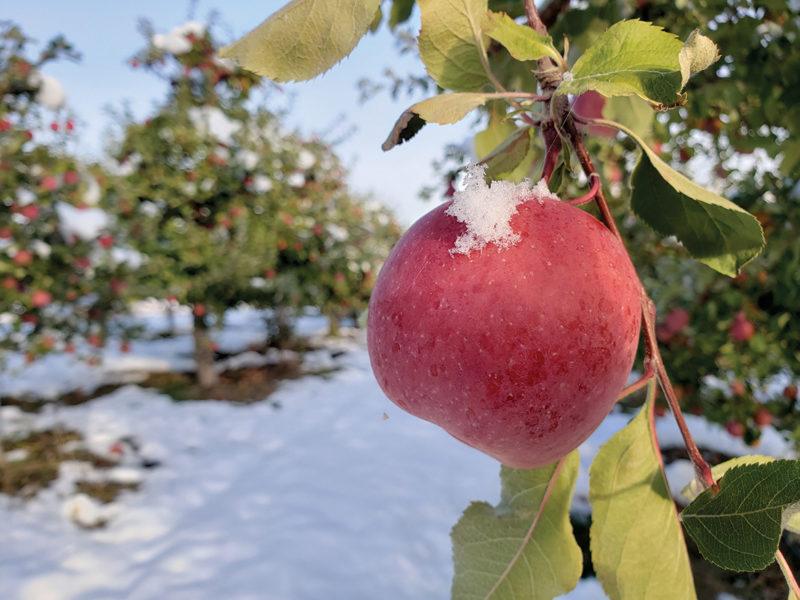KELOWNA – Okanagan apple growers say ongoing low returns and rising input costs have pushed them to the verge of quitting the industry.
“The financial returns of apple growers have been steadily declining for the past three years,” says Pinder Dhaliwal, an apple grower in Oliver and president of the BC Fruit Growers Association. “On average, apple growers are getting 12 cents per pound for their produce. However, it cost growers 30 cents per pound. Under such a scenario, it is very difficult for the farmers to survive.”
The data shows that Ambrosia apples have been hit hardest. Returns dropped from 34 cents a pound in 2016 to only 13 cents a pound in 2019. Similarly, Spartans returned 15 cents a pound in 2016 but farmers received just 2 cents a pound in 2019.
Growers say the main reasons for declining returns are competition from Washington growers and a lack of support from retailers.
“The common practice of retailers buying apples from other countries is a major reason for the drop in prices in BC,” said Amarjit Singh Lalli, a Kelowna grower with 20 acres.
Lalli backed a late resolution at the BCFGA annual convention last winter seeking immediate, short-term financial support from the province for losses in 2019, and urging anti-dumping duties against US apples among other measures.
Competition from Washington, the largest producer of apples in North America, remains an ongoing issue.
“Apple production in British Columbia reduced to 70,300 tons in 2019 from 155,000 tons in 1964. In contrast, apple production in Washington increased to 2,746,000 [tons] in comparison to 465,000 in 1964,” says BCFGA general manager Glen Lucas
He says the Columbia River Treaty, ratified in 1964 and now being renegotiated by Canada and the US, delivered a stable supply of irrigation water to Washington State, allowing production there to expand significantly at the expense of BC growers.
Growers would like to see a renegotiated treaty compensate them for benefits that Washington growers have received under the treaty. BCFGA has asked government to consider an annual allocation in the range of $9.25 million.
Apple dumping
Dumping of apples is also a concern. Growers won an anti-dumping case against Red Delicious apples in 1995. The decision resulted in five years of duties, but those ended in 2000. However, some would like to see ongoing monitoring of imports.
“There should be proper checking at the border to avoid any dumping of apples,” says Lalli.
The low cost of imports has helped boost retailers’ margins on apples, which have increased more than 75% since 2016 to $1.48 a pound.
“It is only the producers that are facing the heat. If we look at the figures, retail returns continuously increased while growers continue to face the losses,” says Lucas.
Packing houses also have a role to play, says Lalli, one of the more than 350 growers who ship to the BC Tree Fruits Co-operative.
“Another reason behind the low returns are the expenses of packing,” he says.
BC Tree Fruits has been working to cut packing costs this year. A governance report the co-op received in February urged it to improve fruit quality, setting minimum standards rather than accepting whatever growers delivered. By accepting better fruit, it could cut handling and disposal costs, improving its margins and the returns growers receive.
This year, an incentive program reduced the volume of low-value fruit the co-op received, benefitting growers.
Better returns will improve farmers’ livelihoods, but also make farming more rewarding. This hasn’t been the case for apple growers in recent years.
Nirmal Singh, who has 14 acres of apples, says persistent low returns over the past several years have been frustrating.
“Survival is very difficult. Leave aside the profit – we are not even getting the input costs,” he says.
To raise awareness of the issue, growers have taken several steps to make their concerns heard. They’ve met with the province’s agriculture minister, most recently this past February, and on October 10 the BCFGA sold apples at 12 cents a pound at the Kelowna Farmers and Crafters Market to raise public awareness. The association called it the “BC Apples Farewell Tour,” indicating that apple growers are being forced to quit apple growing.
Apple growers believe the BC government’s contribution to agricultural support programs is the lowest in Canada, and Canada’s support level is below any other developed nation.
Talwinder Singh Bassi, a grower in Oliver, says it’s high time government made policies that put food security first.
“As farmers are facing losses, they will be forced to quit agriculture. Emphasis should be laid on selling of local food first,” he says.
A statement from the BCFGA says that producers are squeezing every penny they can to increase efficiency, and the packing industry is also seeking to improve returns to growers, but government also has a role to play. While the province has devoted significant effort to strengthening farmland protection, it also needs to protect farmers.
“On one hand, efforts and announcements are being made to save the Agriculture Land Reserve, but on the other hand, nothing substantial has been done for the growers,” says Dhaliwal. “A cash subsidy of seven cents per pound was given to [Washington] apple growers during August this year. This kind of support should also be provided to BC apple growers.”
While some growers will give up growing altogether as a result of low returns, others are looking at new crops.
“Many farmers have shifted from apples to cherries in the Okanagan Valley,” says Lalli, who is sticking with apples but replacing Red Delicious with Honeycrisp. “I am working on changing the varieties to survive and get better returns.”


 Cold snap hits Okanagan fruit growers
Cold snap hits Okanagan fruit growers